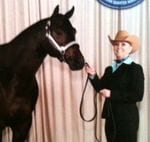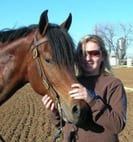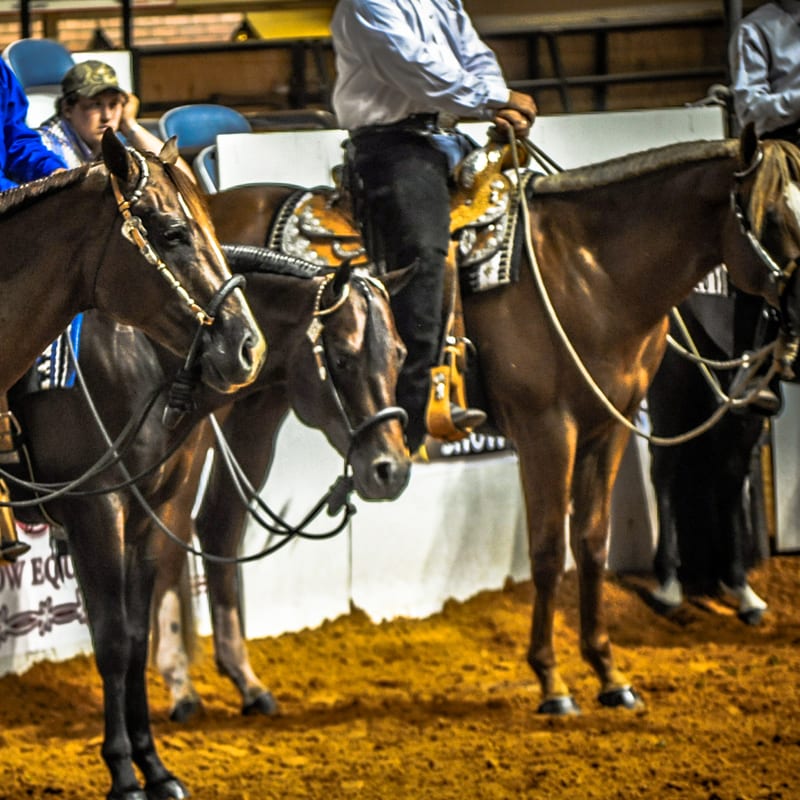During the Great Recession that started at the end of 2007, nearly eight million jobs were lost in the United States. While the economy is slightly improving, it is not surprising that discretionary income that was used for hobbies and personal interests has been depleted, if not completely wiped out, for many families. Since showing horses is a recreational activity, it is also not uncommon that bills generated by this activity are paid last by many horse owners in the industry.
What do trainers do when faced with non-paying clients and what advice do they have for their fellow horsemen? Logically, it makes sense for the trainer to use and follow a written contract when it comes to bills and expenses. However, as many point out, when long-term clients and friends are involved, it easily clouds the issue and makes the situation even more difficult to resolve.
 Blake Carney–In this economy, it’s all about give and take. I need my clients to pay their bills on time, but I also understand the world we are living in, and to keep a full barn, sometimes I have to make it work. It’s easy to say ‘stick to the contract’, but in our business, you become friends with your clients, even when you try not to. You travel with them, eat with them, tell them things about your day-to-day life. Sometimes, when it comes time to be the business man again, I admit I let my emotions get in the way. I have customers from every end of the spectrum– including clients who pay me while working through college, teachers supporting their child’s dream, retired ladies who are finally getting to live their own dream, and clients from around the country that I don’t see but a couple times a year. Some of these clients walk in the barn with a check in hand, others need some friendly reminders. I am very up front with my billing. Aside from knowing their month to month standard bill, I usually flat rate my shows and tell them the cost of the show before we even leave–if possible even weeks in advance. That way, if they can’t afford to make the trip, they just skip it. Personally, I do not nickel and dime, even when I should. I had a few horses this year have to go home or move out for unpaid bills. I try to not let it get out of control, and if I do, I only have myself to blame. If there is a problem and someone is up front with me, I can make it work for them as long as it doesn’t become a habit. On a different note, for my personal budget, I try to make sure my personal bills are covered by my training and board income, and try not to rely on shows, outside lessons, and commissions as a requirement for me to survive.
Blake Carney–In this economy, it’s all about give and take. I need my clients to pay their bills on time, but I also understand the world we are living in, and to keep a full barn, sometimes I have to make it work. It’s easy to say ‘stick to the contract’, but in our business, you become friends with your clients, even when you try not to. You travel with them, eat with them, tell them things about your day-to-day life. Sometimes, when it comes time to be the business man again, I admit I let my emotions get in the way. I have customers from every end of the spectrum– including clients who pay me while working through college, teachers supporting their child’s dream, retired ladies who are finally getting to live their own dream, and clients from around the country that I don’t see but a couple times a year. Some of these clients walk in the barn with a check in hand, others need some friendly reminders. I am very up front with my billing. Aside from knowing their month to month standard bill, I usually flat rate my shows and tell them the cost of the show before we even leave–if possible even weeks in advance. That way, if they can’t afford to make the trip, they just skip it. Personally, I do not nickel and dime, even when I should. I had a few horses this year have to go home or move out for unpaid bills. I try to not let it get out of control, and if I do, I only have myself to blame. If there is a problem and someone is up front with me, I can make it work for them as long as it doesn’t become a habit. On a different note, for my personal budget, I try to make sure my personal bills are covered by my training and board income, and try not to rely on shows, outside lessons, and commissions as a requirement for me to survive.
 Katy Jo Pickard–Unfortunately, there isn’t a whole lot we can do in most states. There are some where we can file a lien, but, it all takes so long that it seems like the risk of running up your expenses can often exceed the balance owed. I think that it’s important to stick together as trainers. Hopefully, if somebody owes us money, and, they are moving to another barn–the trainer won’t take the horse until I’m paid. It also helps to communicate between each other so that we know what kind of client we are dealing with. I mean, sometimes, people deserve the benefit of the doubt and sometimes they don’t. As for a contract, it’s highly unlikely to hold up in court. There is far too much grey area in this business between the job description and the the responsibilities of both parties. I recommend that other trainers try and bill a month in advance so that you are not out of pocket too much money. Also try and not front too much money for people. I keep a credit card on file for my clients, and, if I can with their permission, I use it for things like stalls and entries, vet bills, etc. Those things are kinds of things that hurt the most if they skip out on their bill. It also gives you a feel for where people are in their relationship with you. If they don’t want you to use their card, and they don’t make sure they get you a check on time, then, it should certainly make you pause before you front more money for them. Plus, cash flow can be a real problem when you are shelling out all kinds of money a month or two in advance. The reality is every business assumes some risk when they front money in order to run their company. It’s not just the horse business. Maybe I’m a bit negative about it, but, most likely, we are going to be on the losing end, so, don’t let it get out of hand. Keep track of your account receivables– as, it is the cost of doing business, and maybe you can use it on your taxes.
Katy Jo Pickard–Unfortunately, there isn’t a whole lot we can do in most states. There are some where we can file a lien, but, it all takes so long that it seems like the risk of running up your expenses can often exceed the balance owed. I think that it’s important to stick together as trainers. Hopefully, if somebody owes us money, and, they are moving to another barn–the trainer won’t take the horse until I’m paid. It also helps to communicate between each other so that we know what kind of client we are dealing with. I mean, sometimes, people deserve the benefit of the doubt and sometimes they don’t. As for a contract, it’s highly unlikely to hold up in court. There is far too much grey area in this business between the job description and the the responsibilities of both parties. I recommend that other trainers try and bill a month in advance so that you are not out of pocket too much money. Also try and not front too much money for people. I keep a credit card on file for my clients, and, if I can with their permission, I use it for things like stalls and entries, vet bills, etc. Those things are kinds of things that hurt the most if they skip out on their bill. It also gives you a feel for where people are in their relationship with you. If they don’t want you to use their card, and they don’t make sure they get you a check on time, then, it should certainly make you pause before you front more money for them. Plus, cash flow can be a real problem when you are shelling out all kinds of money a month or two in advance. The reality is every business assumes some risk when they front money in order to run their company. It’s not just the horse business. Maybe I’m a bit negative about it, but, most likely, we are going to be on the losing end, so, don’t let it get out of hand. Keep track of your account receivables– as, it is the cost of doing business, and maybe you can use it on your taxes.
 Lori Gordon–I have never had much of a collections problem since I worked in advertising out of college where we had to make sure all the accounts paid their bills on time. I have a legal blanket liability form for all clients bringing horses into the barn or taking lessons, and, then, an additional legal form to sign for whatever service you are purchasing ie: training, sales consignment, purchasing, hauling, ect. About 20 years ago, I had some people try to not pay me $260. I took them to the magistrate, and, the Judge looked at my legal forms, looked at them and said, “Did you sign this?” They said, “Yes”. She said, “What is the question?” It was a small amount, but, I thought it would set a precedent that I am serious about my business, my work, and expect to get paid. I never had any trouble again. My regular customers that have bills due on the first have until the fifth of the month to pay before I tack on a ten percent late fee. If any were late, by the third or fourth, I would be on the phone arranging payment or for them to pick up their horse. I don’t let the meter run if they can’t pay what is currently due. I think if you set strong parameters it helps in any business situation, but especially in a downward economy. If your boundaries aren’t firm, people in a bind will slide on your fee and put you last on the list.
Lori Gordon–I have never had much of a collections problem since I worked in advertising out of college where we had to make sure all the accounts paid their bills on time. I have a legal blanket liability form for all clients bringing horses into the barn or taking lessons, and, then, an additional legal form to sign for whatever service you are purchasing ie: training, sales consignment, purchasing, hauling, ect. About 20 years ago, I had some people try to not pay me $260. I took them to the magistrate, and, the Judge looked at my legal forms, looked at them and said, “Did you sign this?” They said, “Yes”. She said, “What is the question?” It was a small amount, but, I thought it would set a precedent that I am serious about my business, my work, and expect to get paid. I never had any trouble again. My regular customers that have bills due on the first have until the fifth of the month to pay before I tack on a ten percent late fee. If any were late, by the third or fourth, I would be on the phone arranging payment or for them to pick up their horse. I don’t let the meter run if they can’t pay what is currently due. I think if you set strong parameters it helps in any business situation, but especially in a downward economy. If your boundaries aren’t firm, people in a bind will slide on your fee and put you last on the list.
 Becki Schwab—I have dealt with several situations like this, where a few clients have built up significant debt with training bills, etc. The clients had every excuse in the book as to why they couldn’t pay on time, but I was very understanding given the economy. I know everyone struggles, and let’s face it, showing horses is a hobby, and, it is the first thing to get pushed back as far as bills go. I keep a exact record of payments and how much money is owed. Of course, I always have clients sign contracts, so when and if a client builds up debt, I have legal help to make sure the debt is paid off. My uncle is a lawyer, so he has helped me a lot with these situations. I always tell my clients that I will work with them to make showing horses affordable. I offer my clients the opportunity to work off some of their debt by cleaning stalls, or doing some weekend feedings. However, I did have a few clients whose debt was too significant to work off the amount owed. I went and talked with my uncle, and he helped me write up a payment plan contract for those few clients. The payment plan contract was basically like any debt collection plan. They had a specific amount of money that was owed each month, and if a payment was missed, the amount was due in full immediately or a lien was to be put on the horse. It’s always hard when it is a long time client and/or close friend, but this is a business and my way of living. I have bills to pay as well, and if you can’t budget for your horse to be in training, you need to take your horse home. I have learned a lot in my time of being a trainer, and, sometimes, it is not easy to put aside friendship and take a more business approach to handling this sort of situation, but a debt is a debt.
Becki Schwab—I have dealt with several situations like this, where a few clients have built up significant debt with training bills, etc. The clients had every excuse in the book as to why they couldn’t pay on time, but I was very understanding given the economy. I know everyone struggles, and let’s face it, showing horses is a hobby, and, it is the first thing to get pushed back as far as bills go. I keep a exact record of payments and how much money is owed. Of course, I always have clients sign contracts, so when and if a client builds up debt, I have legal help to make sure the debt is paid off. My uncle is a lawyer, so he has helped me a lot with these situations. I always tell my clients that I will work with them to make showing horses affordable. I offer my clients the opportunity to work off some of their debt by cleaning stalls, or doing some weekend feedings. However, I did have a few clients whose debt was too significant to work off the amount owed. I went and talked with my uncle, and he helped me write up a payment plan contract for those few clients. The payment plan contract was basically like any debt collection plan. They had a specific amount of money that was owed each month, and if a payment was missed, the amount was due in full immediately or a lien was to be put on the horse. It’s always hard when it is a long time client and/or close friend, but this is a business and my way of living. I have bills to pay as well, and if you can’t budget for your horse to be in training, you need to take your horse home. I have learned a lot in my time of being a trainer, and, sometimes, it is not easy to put aside friendship and take a more business approach to handling this sort of situation, but a debt is a debt.
 Kim Reynolds–First
Kim Reynolds–First
of all, I don’t let it get to that point! My bills are due upon
receiving invoice, not 30 days after. If not paid, then, we do not take
the horses to any horse shows. I am lucky, though, we have great
clients, and they pay their bills. If you have to let the horse go
because you can’t afford to feed on your dime, keep whatever you
can–i.e. blankets, saddles, bridles, tails, clothes, etc. Even though
you don’t want them to think you do not trust them–business is
business! If they refuse to pay, call whatever associations they are
affiliated with and see if they can help. Also, offer for them to make
payments no matter how small–it still shows good faith.
 Tina Price–If the owners know they’re going to have difficulty in paying, then the responsible thing to do is to have that conversation with the trainer before things get to this point. If they choose not to do that, then, they are taking advantage of that friendship. Personally, I do not send a horse home if money is owed. The reason is that all incentives to pay leave when the horse does. In the past, the owner could sign the horse over to the trainer so that it could be sold to recoup the debt, but with the market today as well as the price of feed/hay, that is really not an attractive option. In a bad situation, to keep from having to feed animals that were not mine, perhaps for months, I’d offer the owners a deal. I’d offer to forgive the entire debt if a portion/percentage could be paid. I’d also offer to barter the debt with saddles, vehicles–anything I could use or sell. That would get some of my money, prevent me from footing the bill on the horses, and get them out of my barn. I would work pretty aggressively to find a way to make that happen. The days of trainers allowing owners to ride them for several months are over. Expenses are too high, money too tight, to let it even go for 30 days. There is always small claims court, but even then, there is no way to ‘make’ them pay. Stableman’s liens are much the same. The answer may be to collect credit card info on all customers and when payment is not made, charge the credit card. I know some trainers that already have this arrangement, as well as many vets. As trainers, we must also be more aware of the attitude of our customers. It’s usually apparent when a customer is strapped fianancially, or when one is living beyond his means. As we’ve seen in the recent months, people will go to great lengths to keep horses in the show pen. Those sorts of owners may well be too great a risk. Unfortunately, there’s still not good way to get blood out of a turnip.
Tina Price–If the owners know they’re going to have difficulty in paying, then the responsible thing to do is to have that conversation with the trainer before things get to this point. If they choose not to do that, then, they are taking advantage of that friendship. Personally, I do not send a horse home if money is owed. The reason is that all incentives to pay leave when the horse does. In the past, the owner could sign the horse over to the trainer so that it could be sold to recoup the debt, but with the market today as well as the price of feed/hay, that is really not an attractive option. In a bad situation, to keep from having to feed animals that were not mine, perhaps for months, I’d offer the owners a deal. I’d offer to forgive the entire debt if a portion/percentage could be paid. I’d also offer to barter the debt with saddles, vehicles–anything I could use or sell. That would get some of my money, prevent me from footing the bill on the horses, and get them out of my barn. I would work pretty aggressively to find a way to make that happen. The days of trainers allowing owners to ride them for several months are over. Expenses are too high, money too tight, to let it even go for 30 days. There is always small claims court, but even then, there is no way to ‘make’ them pay. Stableman’s liens are much the same. The answer may be to collect credit card info on all customers and when payment is not made, charge the credit card. I know some trainers that already have this arrangement, as well as many vets. As trainers, we must also be more aware of the attitude of our customers. It’s usually apparent when a customer is strapped fianancially, or when one is living beyond his means. As we’ve seen in the recent months, people will go to great lengths to keep horses in the show pen. Those sorts of owners may well be too great a risk. Unfortunately, there’s still not good way to get blood out of a turnip.
 Angie Proctor-Reichert–In this economy, many families have had to figure out how to budget. Many people have felt the crunch of paying for hobbies and luxuries- such as full-time training. Due to an already tight budget, there are times when some clients/friends may get behind on their training bill due to an unexpected emergency, or bill. Some people may say, “Stick to the contract” but contracts are not real life in these situations. The flip side is, as a trainer, if you send horses home hoping to get reimbursed for unpaid bills then you take a chance of never being paid for your time in training and money (in grain, hay, shavings, hauling, etc). The plan I have implemented to help out any clients/friends in a crisis is a grace period that allows them to decide just how much they can afford to pay by giving them three options: (1.) The horse can go on a board-only bill where they remain in the show barn, but are not in training. (2.) A board-only option with a step down to an outside paddock/run-in barn for a little less money (3.) Even another step down for lessor money is a pasture board option. I have been very lucky in my business, but being prepared with a plan that allows options is important for everyone.
Angie Proctor-Reichert–In this economy, many families have had to figure out how to budget. Many people have felt the crunch of paying for hobbies and luxuries- such as full-time training. Due to an already tight budget, there are times when some clients/friends may get behind on their training bill due to an unexpected emergency, or bill. Some people may say, “Stick to the contract” but contracts are not real life in these situations. The flip side is, as a trainer, if you send horses home hoping to get reimbursed for unpaid bills then you take a chance of never being paid for your time in training and money (in grain, hay, shavings, hauling, etc). The plan I have implemented to help out any clients/friends in a crisis is a grace period that allows them to decide just how much they can afford to pay by giving them three options: (1.) The horse can go on a board-only bill where they remain in the show barn, but are not in training. (2.) A board-only option with a step down to an outside paddock/run-in barn for a little less money (3.) Even another step down for lessor money is a pasture board option. I have been very lucky in my business, but being prepared with a plan that allows options is important for everyone.
 Rebecca Merchant Halvorson–It
Rebecca Merchant Halvorson–It
is tough, and we try to never let the horse go home–obviously
possession is the best answer, but I do understand if the bill starts to
get large, then, it gets to be a large burden on your business. But,
AQHA has a form that you can download called a Stableman’s Lien, you can
fill it out, then, send to the customer. I believe it is a legal
document that you can file with AQHA and a lawyer.
 Missy Thyfault–I truly have been lucky on the whole that most of my customers have enough courtesy to pay within thirty days. I always feel partially at fault if someone is late, because one of my main flaws would have to be my irregular billing patterns. Some of my customers just send my monthly training on the first and send a second check when the show expenses come on my bill which is appreciated. However, I do try to get them out on time and I believe a customer knows the basic cost of showing horses. The biggest hardship is when you are needing that check to come as the money was spent at least a month prior on our end. Especially when stalls are sent in by check and farriers have to be paid, as well as the feed and grain already ingested. The list of money out of pocket is long. Usually a friendly text is all that is needed to remind someone that you need that check to arrive. Communicating on overdue bills is key. I can say a customer who is a “good pay” is appreciated by every trainer across the board, because it shows respect for the job we do. I have only been stuck for a bill twice in all my years of training. Both times surprised me in that I had thought them to be good people and was shocked at the behavior. I took it as a lesson in people reading and earlier detection! I really have been lucky and have a great customer base.
Missy Thyfault–I truly have been lucky on the whole that most of my customers have enough courtesy to pay within thirty days. I always feel partially at fault if someone is late, because one of my main flaws would have to be my irregular billing patterns. Some of my customers just send my monthly training on the first and send a second check when the show expenses come on my bill which is appreciated. However, I do try to get them out on time and I believe a customer knows the basic cost of showing horses. The biggest hardship is when you are needing that check to come as the money was spent at least a month prior on our end. Especially when stalls are sent in by check and farriers have to be paid, as well as the feed and grain already ingested. The list of money out of pocket is long. Usually a friendly text is all that is needed to remind someone that you need that check to arrive. Communicating on overdue bills is key. I can say a customer who is a “good pay” is appreciated by every trainer across the board, because it shows respect for the job we do. I have only been stuck for a bill twice in all my years of training. Both times surprised me in that I had thought them to be good people and was shocked at the behavior. I took it as a lesson in people reading and earlier detection! I really have been lucky and have a great customer base.
 Anne Shafer–I think I have been very lucky in that department. I have had only one client that I had this kind of problem. After months of not paying, I asked her to leave, but, before she could take her mare out, she had to make a payment to me. Then, she was to make a payment every month after. I kept all of her tack, and I had the horse’s papers. Things didn’t go a planned, and I took her to small claims court and won. Up until that point, I never had anyone sign a contract. I do now. I also print on each statement each month when the bill is due, and that there is a late fee if paid after the due date. If a client has not paid by the 25th of the month, I make a phone call to them. This can be very hard if it is a long-time client, or a good friend. But either way, you can’t avoid the situation nor can you let it go for months. I always try to break the ice by asking if then received their statement or not. Then, ask them if there is a problem, and, if so, I try to work out something that works for both parties. The main thing is, never let it go past two months, the further a person gets behind, the harder it is to catch up.
Anne Shafer–I think I have been very lucky in that department. I have had only one client that I had this kind of problem. After months of not paying, I asked her to leave, but, before she could take her mare out, she had to make a payment to me. Then, she was to make a payment every month after. I kept all of her tack, and I had the horse’s papers. Things didn’t go a planned, and I took her to small claims court and won. Up until that point, I never had anyone sign a contract. I do now. I also print on each statement each month when the bill is due, and that there is a late fee if paid after the due date. If a client has not paid by the 25th of the month, I make a phone call to them. This can be very hard if it is a long-time client, or a good friend. But either way, you can’t avoid the situation nor can you let it go for months. I always try to break the ice by asking if then received their statement or not. Then, ask them if there is a problem, and, if so, I try to work out something that works for both parties. The main thing is, never let it go past two months, the further a person gets behind, the harder it is to catch up.
 Suzanne Pickard–We try very hard to just weed those clients out and stick with our good ones. Honestly, if they don’t pay, it’s on their conscience. But, if it is for a large sum, one can always consider going to court. Personally, we have never done that, and it’s easier to cut your losses and go on. The best tip I have for people is to stay on top of it! Don’t let people get too far behind. Stop taking the horse to horse shows–even if it’s your best horse, and, it’s tempting–you just can’t keep running up the bill.
Suzanne Pickard–We try very hard to just weed those clients out and stick with our good ones. Honestly, if they don’t pay, it’s on their conscience. But, if it is for a large sum, one can always consider going to court. Personally, we have never done that, and it’s easier to cut your losses and go on. The best tip I have for people is to stay on top of it! Don’t let people get too far behind. Stop taking the horse to horse shows–even if it’s your best horse, and, it’s tempting–you just can’t keep running up the bill.
 Sherrye Trafton-Johnson–When clients cannot or won’t pay their bills, the lines of communication between the parties must be open for a timely and friendly resolution. Many states provide an opportunity for barn owners/ trainers to execute a “Horse Lien” against unpaid services by the client/border.
Sherrye Trafton-Johnson–When clients cannot or won’t pay their bills, the lines of communication between the parties must be open for a timely and friendly resolution. Many states provide an opportunity for barn owners/ trainers to execute a “Horse Lien” against unpaid services by the client/border.
 Gail Emmons Mitchell–From my experience, we are a team. Either we all win or we all lose. I have had the good fortune to have amazing clients that work very hard for their money at jobs that they hate, just so they can have the horses with me. Then, there were others that were scraping to get by and were in over their heads. I could usually see the signs before we got in too deep. I have sent horses home just to stop the bleeding. I am not hauling as much as I used to. I am running a boarding barn and giving a lot of lessons. I do a lot of local advertising and have open house and barn parties. I am making better money now, and I don’t have the overhead or the stress of clients not paying training and hauling fees.
Gail Emmons Mitchell–From my experience, we are a team. Either we all win or we all lose. I have had the good fortune to have amazing clients that work very hard for their money at jobs that they hate, just so they can have the horses with me. Then, there were others that were scraping to get by and were in over their heads. I could usually see the signs before we got in too deep. I have sent horses home just to stop the bleeding. I am not hauling as much as I used to. I am running a boarding barn and giving a lot of lessons. I do a lot of local advertising and have open house and barn parties. I am making better money now, and I don’t have the overhead or the stress of clients not paying training and hauling fees.









